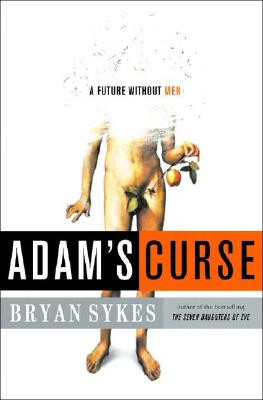

| ADAM'S CURSE: A Future Without Men Bryan Sykes New York: W. W. Norton & Company, 2004 |
Rating: 4.5 High |
|||
| ISBN 0-393-05896-4 | 318pp. | HC | $25.95 | |
| Title page: | "ADAM'S CURSE: A Future Without Men" |
| Misleading. While the book does discuss both topics, the latter is not a definition of the former. |
| Page 5: | "I was able to show that each of us is connected by unbroken maternal threads, traceable with DNA, to one of a few ancestral women living thousands, even tens of thousands of years ago. I was also able to track the movements of our ancestors across the globe and solve some of the riddles that had puzzled scholars for centuries — among them the origin of the Polynesian islanders, the fate of the Neanderthals and the nature of the first colonization of Europe by Homo Sapiens before the last Ice Age." |
| Sweeping claims. (However, without having read the book this refers to, I nevertheless feel they are justified.) |
| Page 11: | "Sometimes these surnames were derived from an occupation — like Carpenter, Smith, or Butcher; sometimes they evolved from a nickname, often a descriptive one, such as Redhead or Smallpiece." |
| It's a good thing there was no spam e-mail back in those times. Mr. Smallpiece probably would have been besieged by it. |
| Page 30: | "Theirs is a cacophony of different sounds, both male and female, individual voices are drowned in the throng of noise." |
| Change comma to semicolon: S/B "both male and female;". |
| Page 62: | "My Y-chromosome long arm, it turns out, is slightly bigger than the average and so, presumably, is Sir Richard's." |
| This is puzzling because previously the book gave the impression that Sykes had examined Sir Richard's Y chromosome and found it to be similar to his own. |
| Page 68: | "It no longer looked like a coincidence that David Page had christened the crucial fragment DP1007, combining his own initials with a license to kill. But the triumph, like so many of James Bond's conquests, was short-lived." |
| But was it more than a coincidence? I doubt it; I think this is just Sykes taking liberties. |
| Page 79: | "These examples all show that sex can be decided in many different ways, but they do not answer an even more fundamental question. Why have sex in the first place?" |
| This is the same question that was asked at the end of the last chapter. |
| Page 81: | "Consider the greenfly that cover the stems of garden plants in the summer and suck out their juices." |
| Error of number, or Britishism? If the former, S/B "greenflies that cover". |
| Page 84: | "There are eight rabbits altogether in these new litters, four males and four females." |
| Going in, this half-male-and-half-female rule was not stated. Change it, and the advantage of cloning diminishes. |
| Page 131: | "Mutations can occur to change a DNA base more or less anywhere within the control region but, because the precise sequence of bases is unimportant, it will not make any difference to the mitochondria which carry it. It will not have any effect at all, harmful or otherwise. Individuals who carry mutations in their mitochondrial control regions will be neither eliminated nor encouraged by natural selection." |
| See, what he's saying here is that mutations can occur to change a DNA base more or less anywhere within the control region but, because the precise sequence of bases is unimportant, it will not make any difference to the mitochondria which carry it. It will not have any effect at all, harmful or otherwise. Individuals who carry mutations in their mitochondrial control regions will be neither eliminated nor encouraged by natural selection.
How did I know this? I just played a hunch — a lucky guess. Sometimes a hunch pays off; sometimes it don't. I just played a hunch.1 |
| Page 161: | "The Age of the Vikings has all the hallmarks of Adam's Curse: the insistent urge of men to mate with as many women as possible, and the intense rivalry among Y-chromosomes that ensues." |
| This is the first explanation of what the author really means by "Adam's Curse". |
| Page 164: | "During my search for Viking Y-chromosomes in the Highlands and Islands of Scotland..." |
| Should "Highlands" and "Islands" be capitalized? |
| Page 175: | "But Somerled reneged on the agreement and two years later, attacked the Isle of Man, drove Godred out and seized the remainder of his possessions." |
| Move comma: S/B "agreement, and two years later attacked". |
| Page 235: | "The blind rage of the male, released from its chains, has slowly and deliberately enslaved the female." |
| This is one of the pitfalls of purple prose: Passion turns off the logical parser. When did "blind rage" ever do anything "slowly and deliberately"? |

 To contact Chris Winter, send email to this address.
To contact Chris Winter, send email to this address.